Probably the most thorough, though in my opinion, misguided defense of the so called Law of Silence, comes from a conservative, non-institutional church of Christ website called Bible.ca.
I have to admire the creativity of the author in presenting these opinions using the traffic sign analogies. They show a semblance of logic, much like a sound bite of a politician. But when you get under the surface, they are a bit simplistic, illogical, and scripturally inconsistentŌĆöin my own opinion, of course.
Below are the arguments presented on the website, followed by my indented responses. You can jump to the most common arguments for the Law of Silence and my responses to them here:
- Noah was prohibited by God’s silence from using other types of wood on the ark.
- Cain sacrificed of his crops when God’s silence prohibited it.
- Nadab and Abihu offered “strange fire” when God’s silence prohibited it.
- Uzzah touched the ark when God’s silence prohibited it.
 Without this sign, a National bank was prohibited.
Without this sign, a National bank was prohibited.
Bible.ca: The US constitution did not specifically authorize the US Government to run a national bank. Jefferson said the “sign authorizing” a national bank did not exist in Constitution, and this silence must be obeyed. Alexander Hamilton argued that finding this “sign” in the constitution was not needed and a federal bank was therefore not prohibited because the constitution doesnŌĆÖt say we canŌĆÖt!
Click here for more detail on the Constitutional history of the US and how it applies to Bible interpretation.
- My response: I would have to call myself a strict constructionist when it comes to the constitution. It is clearly a legal document. But even in interpreting the constitution, it allows citizens to do things that the constitution is ŌĆ£silentŌĆØ on. In other words, if the Constitution doesnŌĆÖt outlaw flying planes, we may do it. We donŌĆÖt have to find ŌĆ£authorizationŌĆØ to fly planes in the Constitution before we can accept it as legal.
IŌĆÖm not sure that IŌĆÖd call myself a strict constructionist when it comes to the Bible, because that would mean considering it a book of laws, codes, and regulations. I no longer believe thatŌĆÖs what the Bible is. It is authoritative, inspired, and accurate. But while the Old Law included a code of regulations and rules, the New Testament scriptures are simply a compiled volume of history (the gospels and Acts), letters (all of the epistles), and a book of prophecy (Revelation).
They give us a broad view of our New Covenant, not a compendium of rules and regulations for church meetings.
I think this distinction in how we view the New Testament (is it a law book or something else?) is what produces either ŌĆ£law-keepersŌĆØ (strict constructionists) on one hand or loving servants of the Lord on the other.
One of the best illustration I know to illustrate that it is not intended to be a law book, per se, is to look at JesusŌĆÖ command to wash each othersŌĆÖ feet. If it is a law book, 99.9% of the religious world, including most conservative ŌĆ£law-keepers,ŌĆØ are breaking the law by not doing this.
 Ark of Gopher wood, all else prohibited.
Ark of Gopher wood, all else prohibited.
Bible.ca: God told Noah to build the ark out of Gopher wood with the exact dimensions of 300x50x30 cubits. God did not list all the woods Noah could not use, but specified the only wood he could use. Although teak is the ship-builders wood of choice, it was prohibited!
- My response: I agree that when we ARE told what to do, if we fail to do it (in the proper context of the command) we are going against GodŌĆÖs command.
However, while Noah was told to ŌĆ£build it out of gopher wood,ŌĆØ there may have been numerous aspects of his instructions that were left to NoahŌĆÖs judgment. For instance, if he had been told to build a ramp, but never told NOT to use mounded earth or stone, or another type of wood, Noah would have been free to use any means in accomplishing the task of getting the animals onto the ark.
 Animal sacrifice of firstlings only, all else prohibited.
Animal sacrifice of firstlings only, all else prohibited.
Bible.ca: Gen 4:3-5; Heb 11:4; Matthew 23:35; Jude 11; 1 John 3:12 Although we cannot be certain why CainŌĆÖs offering was rejected, it appears that had God asked for an animal sacrifice, but Cain being a farmer, would have had to ask Able for an animal. The pride that prevented him from asking Able, led to him murdering Able out of jealousy. Perhaps Cain reasoned: “God never said I couldnŌĆÖt offer a vegetable sacrifice.”
- My response: Or perhaps that wasn’t his reasoning at all. Since Cain clearly sinned, and sin is a transgression of law, we can assume that it was clearly communicated to Cain what to offer. He may have even been told what NOT to offer. In either case, we can know for certain that he disobeyed by either doing what he was told NOT to do, or NOT doing what he was told TO do. That is far different than what is often assumed, that sinned by acting “presumptuously.”
Genesis 4:3-5 – In the course of time Cain brought some of the fruits of the soil as an offering to the LORD. 4 But Abel brought fat portions from some of the firstborn of his flock. The LORD looked with favor on Abel and his offering, 5 but on Cain and his offering he did not look with favor. So Cain was very angry, and his face was downcast.
Hebrews 11:4 – By faith Abel offered God a better sacrifice than Cain did. By faith he was commended as a righteous man, when God spoke well of his offerings. And by faith he still speaks, even though he is dead.
Matthew 23:35 – And so upon you will come all the righteous blood that has been shed on earth, from the blood of righteous Abel to the blood of Zechariah son of Berekiah, whom you murdered between the temple and the altar.
1 John 3:12 – Do not be like Cain, who belonged to the evil one and murdered his brother. And why did he murder him? Because his own actions were evil and his brother’s were righteous.
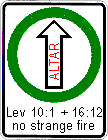 Fire only from altar, all else prohibited.
Fire only from altar, all else prohibited.
Bible.ca: Nadab and Abihu: “God never said we couldnŌĆÖt get fire for sacrifice somewhere else.
Nadab and Abihu: Lev 10:1-7 were told to get the fire for the incense pan from the altar: Lev 16:12; 6:12,13; Nun 16:46. Instead they got the fire for the incense from some other place and God called it “strange fire” and killed them. The Bible calls doing that which God was silent about, was called “treating God unholy and with dishonour”. Although Nadab and Abihu could have argued, “God never forbade us from taking the fire from somewhere else”, God killed them for disobedience.
- My response: This also was a direct disobedience of a commandŌĆösubstituting their own will for GodŌĆÖs. They were to get their fire from the coals on the altar. They disobeyed. This is not an example of doing something God was silent on.
Leviticus 10:1-3 – Aaron’s sons Nadab and Abihu took their censers, put fire in them and added incense; and they offered unauthorized fire before the LORD, contrary to his command. 2 So fire came out from the presence of the LORD and consumed them, and they died before the LORD.
Leviticus 16:12 – He is to take a censer full of burning coals from the altar before the LORD and two handfuls of finely ground fragrant incense and take them behind the curtain.
Leviticus 6:12-13 – The fire on the altar must be kept burning; it must not go out. Every morning the priest is to add firewood and arrange the burnt offering on the fire and burn the fat of the fellowship offerings [a] on it. 13 The fire must be kept burning on the altar continuously; it must not go out.
Numbers 16:46 – Then Moses said to Aaron, “Take your censer and put incense in it, along with fire from the altar, and hurry to the assembly to make atonement for them. Wrath has come out from the LORD; the plague has started.”
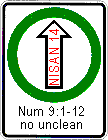 Only the clean on Nissan 14, unclean prohibited.
Only the clean on Nissan 14, unclean prohibited.
Bible.ca: In, Ex 12:1-51, God instituted the Passover on Nisan 14 (first month, 14th day). The unclean (including those who touch the dead) were forbidden from all the feasts: Num 19:11-13. 2 Chron 30:17. In Num 9:1-12, those who were unclean by touching the dead, complained that they could not eat the Passover. They likely reasoned that they had no choice but to attend to the dead body of a loved one who died in their own home and that it was really a circumstance over which they had no control. Moses understood they had a valid point in their complaint. But rather than speaking where God was silent, Moses said, “Wait, and I will listen to what the Lord will command concerning you” Num 9:8. Now if God had never replied, Moses would not have allowed them to partake of the Passover. But God did reply, and His answer was NO! God would not permit the unclean to each the Passover on Nisan 14 EVER! But God did create a special second Passover feast exactly one month later on Iyyar 14 (second month, 14th day). Num 9:12. Moses respected the silence of God!
- My response: To observe the Passover while unclean would have been wrong. This was not a matter of GodŌĆÖs silence being law, it is a matter of law being law. God had already legislated that the unclean could not observe the Passover, and this is what He expected the people to obey.
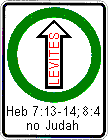 Only Levites are priests, all others prohibited.
Only Levites are priests, all others prohibited.
Bible.ca: Levi, the third son of Jacob, was given no land inheritance: Joshua 18:7. Instead, they were to live off the tithe those tribes who got land of the people: Numbers 18:21-24; Heb 7:5. God traded the entire tribe of Levi for the firstborn of each tribe: Numbers 3:12-13. They were charged with the tabernacle and sacrifice and teaching GodŌĆÖs law to the people: Deut 33:10. Jesus (of the tribe of Judah) could not be Levitical priest: Heb 7:12-14 + 8:4. Yet Jeriboam ordained non-Levites priests: 1 Ki 12:31 and the Jews had allowed a man of the tribe of Judah to be a Levite and priest: Judges 17:7,13. Although God had specifically forbidden non Levites (Num 18:22-23) it is powerful to note that the Hebrew writer doesn’t argue that God forbade Judah (even though he had), but rather stated that God spoke nothing about Judah being priests. This proves that God expects men to respect His silence. God abolished the Aaronic priesthood and ordained Jesus after the “Melchizedek priesthood” Heb 7:1-11. It is not clear who paid tithes to who in Gen 14:20, “And he gave him a tenth of all.” It is possible that the Jews had argued that Abram was the receiver of the tithes, not the giver. But Heb. 7:4 proves that Abraham was the lesser.
- My response: The author refuted his own point in a couple of different ways. First, Numbers 18:22-23 makes it clear that God was not silent on the question. Moses did, in fact, specifically convey the instruction that no Israelite could serve as priest who was not of the tribe of Levi. Second, this means that the writer of Hebrews was not speaking literally when he said ŌĆ£in regard to that tribe (Judah) Moses said nothing about priests.ŌĆØ Moses did say something very specific about this. So the writer of Hebrews was clearly using a figure of speach, similar to saying ŌĆ£in regard to the tribe of Judah, Moses never permitted them to be priests.ŌĆØ
In short, this is another case where the question is not one that God was silent on. He was explicit, both in the positive (Levi will hold the priesthood) and in the negative (all but Levi are prohibited from holding the priesthood).
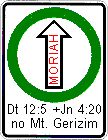 Jerusalem only holy place, Mt Gerizim is not.
Jerusalem only holy place, Mt Gerizim is not.
Bible.ca: Samaritans: “God never said this mountain was not holy”
Deut. 12:5-7,11; 1 Kings 8:16; 1 Kings 9:3; John 4:20. God had specified Jerusalem which sat on Mt. Zion (Abraham offered Isaac on temple site: Mt. Moriah or “Jehovah-Jireh” Gen 22:1,14; 2 Chron 3:1, in Jerusalem, of King Melchizedek), as the holy place of worship for the Jews. The Samaritans were remnants of apostate Jews who were exiled to Assyria in 722 BC. A temple had been built about 350 BC on Mt Gerizim by the Samaritans and staffed with renegade and disenfranchised priests from Jerusalem. It was destroyed by John Hyrcanus about 128 BC. During the time of Christ, the Samaritans and the Jews held each other in contempt. The question about which mountain does God prefer, by the woman at the well, captures the key essence of the dispute of the two religions that share a common heritage! The Samaritans may have reasoned, that the Scriptures did not say, “DonŌĆÖt worship on Mount Gerizim.” Historically God had pronounced the blessings of Israel from on top of Mount Gerizim in Deut 11:29; 27:11. But Jesus settled the issue siding with the Jews who had the express approval of His word!
- My response: Or, as appears more likely, the Samaritans didnŌĆÖt reason at all and simply paid no attention to the Word of God given through Moses.
In any case, there is still no ŌĆ£law of silenceŌĆØ in this example. God was not silent on where the center of Jewish religion was to be in order to fulfill prophecyŌĆöMt. Zion.
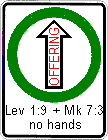 Washing of sacrifices was commanded, enforcing more is prohibited.
Washing of sacrifices was commanded, enforcing more is prohibited.
Bible.ca: Pharisees: “God never said not to require washing of cups”
Mark 7:1-8. God commanded that the priests were to be washed Ex. 29:1-4 and that the legs and guts of animal sacrifices were to be washed before being sacrificed: Lev 1:9. The Jews at the time of Christ had begun to enforce the human origin tradition of washing of hands and pots before common meals in order to be holy before God. Jesus refused to be bound by this law that spoke where God was silent! The washing of hands, cups, vessels as part of worship was not commanded in their law, and thus it was wrong for them to do so. They might have reasoned, “God never said not to! Surely God is happy that we have gone to more trouble!” Jesus stated that God was not happy at all!
- My response: These arguments are becoming really stretched and ironically, they continue to argue against the authorŌĆÖs position. Jesus is condemning the Pharisees for making rules that God never made. ThatŌĆÖs precisely what the ŌĆ£law of silenceŌĆØ doesŌĆöit makes laws (and most importantly, binds them on others) that God never made. These rules are more presumptuous than the acts the rules are supposed to outlaw.
 Death to those who curse
Death to those who curse
Bible.ca: The third commandment was “You shall not take the name of the Lord your God in vain, for the Lord will not leave him unpunished who takes His name in vain.” Exodus 20:7. In Lev 24:10-16 a teenager had cursed the name of Jehovah and they took him to Moses, because he was only 1/2 Jewish. (Egyptian father). They didnŌĆÖt know if they should stone the youth but, “they put him in custody so that the command of the Lord might be made clear to them” Lev 24:12. God said to stone any person who curses His name on Jewish soil! They respected the silence of God and waited for specific instructions!
- My response: There was no silence here. The ŌĆ£stranger in their gatesŌĆØ had always been subject to the same laws as the Jews. The fact that they waited for further action was not because they didnŌĆÖt have enough information, but because they doubted the information they had.
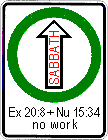 Death to workers on Sabbath
Death to workers on Sabbath
Bible.ca: In the Fourth commandment, God said that no work should be done on the Sabbath. Ex 20:8 But in Num 15:32-36 a man was caught gathering wood on the Sabbath and they took him to Moses, because they were not sure what to do to him. So “they put him in custody because it had not been declared what should be done to him.” Num 15:34. God replied the man should be stoned. They respected the silence of God and waited for specific instructions!
- My response: The reason it was unclear was that they doubted the information they had, not that they didnŌĆÖt have enough information. God was not silent on this at all. They questioned GodŌĆÖs seriousness about it, but there was no silence, according to the Law, on what God demanded (see Ex. 31:15 below). Now, if there had never been a law demanding that a Sabbath breaker be put to death, and they made that rule on their own, that would be a case of speaking where God was silent.
Exodus 31:15 – For six days, work is to be done, but the seventh day is a Sabbath of rest, holy to the LORD. Whoever does any work on the Sabbath day must be put to death.
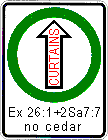 Curtains only, cedar prohibited.
Curtains only, cedar prohibited.
Bible.ca: God had commanded that the tabernacle be built of curtains: Ex 26:1f ; 40:19. King David noticed that the house of cedar he lived in was much nicer than the tent of curtains God lived in (tabernacle) and wanted to build God an elaborate temple: 1 Chron 17:1-6 (2 Sam. 7:1-7) He asked Nathan the prophet about building a temple and Nathan said, “Do all that is in your heart, for God is with you.” (v2) But God did not approve one bit and told Nathan in a dream that he had spoken presumptuously for God when He was silent. God said, “In all places where I have walked with all Israel, have I spoken a word with any of the judges of Israel, whom I commanded to shepherd My people, saying, ŌĆśWhy have you not built for Me a house of cedar?” 1 Chron 17:6. God didnŌĆÖt want David to build the temple because he was a man of war and had shed blood: 1 Chron 28:3. God said that DavidŌĆÖs son Solomon would build the temple. Both God (Isa 42:13) and David were men of war and their sons built the temples. In the spectacular dual fulfillment prophecy of 2 Sam 7:12-17 (1 Chron 17:10-15) Solomon son of David, built the physical temple and Christ, Son of God, built the spiritual temple: John 2:19-21 + Eph 2:19-22.
- My response: Nathan is the one who spoke where God was silent by saying ŌĆ£Do all that is within your heart, for God is with youŌĆØ when in fact God had not said that. God had different plans for a temple that didnŌĆÖt include David himself, and that Nathan wasnŌĆÖt privy to. So Nathan is the one who misspoke and was presumptuous.
However, Nathan would have been equally guilty of this if he had said ŌĆ£DonŌĆÖt build the temple because youŌĆÖre a man of bloodŌĆØ if God had not in fact told him to say that. Speaking where God is silent cuts both ways.
DavidŌĆÖs problem was that he was a man of blood, not that he wanted to ŌĆ£give the best to the Master.ŌĆØ It was OK to feel driven to build a temple for the Lord since David lived in a grand palace while the LordŌĆÖs tabernacle was a tent. A similar sentiment was expressed by the exiled Jews in EzraŌĆÖs time who wanted to return to the homeland and build the house of God:
Haggai 1:4 – ŌĆ£Is it time for you yourselves to dwell in your paneled houses, and this temple to lie in ruins?ŌĆØ (NKJV)
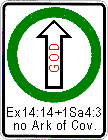 God alone is to provide victory, trusting in anything else prohibited
God alone is to provide victory, trusting in anything else prohibited
Bible.ca: God had taken great effort in showing Israel that if they trusted Him, they would never lose a war with their enemies: “The Lord will fight for you while you keep silent.” Ex 14:14,25; 15:3; Deut 1:30; 3:22; Josh 23:3; 2 Chron 20:29; Neh 4:20. In 1 Samuel 4:1-11, Israel was defeated by the Philistines in a war and the elders asked, “Why has the Lord defeated us today before the Philistines?” Of course the reason (in addition to practicing idolatry 1 Sam 7:3) was because they didnŌĆÖt trust in God to fight their battles for them. Their lack of faith was likely accelerated because of Eli the high priest who tolerated the sin of his two sons. But in 1 Sam 4:3, the elders of Israel came up with the idea, that if they physically carried the Ark of the Covenant the Philistines had captured the Ark of the Covenant with them into war, that God would be with them, and they would surely win! In v5 the people all thought this was a great idea and shouted for joy! The elders were heroes for coming up the novel idea! Of course, this violated the principle of relying on God without physical aids, and bordered on idolatry of the Ark. They were using the Ark as a “lucky charm”, perhaps the first “rabbitŌĆÖs foot” that would guarantee victory. (Similar to Catholics today who carry around a St. ChristopherŌĆÖs metal for safe travels.) But Israel lost a second time in a row and the Ark was captured by the Philistines in 1 Samuel 4:10. Seven months later, the Philistines returned the Ark to Israel. After “the sons of Israel removed the Baals and the Ashtaroth and served the Lord alone in 1 Sam 7:4, they never lost another battle all the days Samuel lived: 1 Sam 7:13.
- My response: The OT is full of exhortations to trust in the Lord alone. There is no Biblical silence when it comes to trusting other gods. To use the musical instrument analogy, if God had said to “make melody in your hearts alone,” that would be the equivalent of outlawing instruments. He did not say that.
 Levites and Poles only to move Ark, all other methods prohibited.
Levites and Poles only to move Ark, all other methods prohibited.
Bible.ca: In Ex 25:13-14, God had commanded that the Ark be carried with poles made of acacia wood and overlay them with gold. The sons of Kohath were to carry the Ark and no one was to actually touch it: Num 4:14-15. Later the Levites did this job: 1 Chron 15:2. After the Philistines had captured and returned that Ark to Israel in 1 Sam 6:10-11, the Levites were careful to use the poles. Then the Ark was “brought it into the house of Abinadab” 1 Sam 7:1-2, and remained there 20 years. David wanted to bring the Ark to Jerusalem, so he transported the ark of the covenant on an brand new ox cart: 1 Chron 13:7. (parallel: 2 Sam. 6:3) But the oxen almost upset the Ark on the cart and Uzzah reached out with his hands to save the Ark from falling and God killed him for touching the Ark: 1 Chron 13:9 (2 Sam. 6:6) DavidŌĆÖs initial reaction was anger at God, then fear. Incredibly it was the priests and the diviners of Dagon (1 Sam 6:2) who first came up with the idea to transport the Ark of the Covenant on a new ox cart when the returned the Ark to Israel: 1 Sam 6:7. David must have thought that if God accepted the new ox cart innovation of the pagan, God would accept it of David! Wrong! The first mistake was the new ox cart, the second was touching the Ark. Good deeds from a human perspective, donŌĆÖt make sin right! Later David did move the Ark to Jerusalem the way God said with the poles on the shoulders of the Levite priests! 1 Chron 15:2,15.
- My response: This is one of the most misunderstood stories in scripture when used to defend the so-called Law of Silence. The question we really need to ask is if the characters in the story acted in direct disobedience of God’s command. The answer is clearly yes, therefore this is not an example of God’s silence being “law.” He wasn’t silent on how the ark was to be carried. The people may have been ignorant of it, but he wasn’t silent on it.
By contrast, God genuinely is silent on the numerous petty debates of Restoration Movement churches, like musical instruments, colleges, missionary societies, etc. Again, the main problem here is when we approach the New Testament scriptures as a book of laws and regulations, rather than as inspired history of how the first century Christians put their new faith into practice. One approach yields legalism and ritualism, the other yields passionate (and compassionate) service to God.
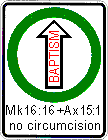 Baptism is essential to salvation, circumcision prohibited.
Baptism is essential to salvation, circumcision prohibited.
Bible.ca: Judaizers: “God never said Circumcision was no longer required.”
God had specifically said that water baptism by immersion for the remission of sins, was essential to salvation in Mk 16:16; Acts 2:38; 22:16; 1 Pet 3:21. Although God had commanded the Jews in the Old Testament to circumcise, he had never said, “You donŌĆÖt need to be circumcised to become a Christian.” The Judaizers in Acts 15:1,5 were teaching that you must not only be believe and be baptized, but also circumcised to be saved! PeterŌĆÖs words: “To whom we gave no such commandment.” Acts 15:24 There was no such commandment as circumcision in order to be saved, and thus, it was wrong. God tells us what is necessary and that rules out everything else!
- My response: These passages are taken grossly out of context, and actually defeat the authorŌĆÖs point. He says ŌĆ£there was no such commandment as circumcision in order to be saved, and thus, it was wrong.ŌĆØ But it is not wrong. Binding it is what is wrong.
Prohibiting all circumcision because we lack authorization for it is speaking up where God is silent. If circumcision is prohibited, most American males are irreversibly ŌĆ£wrong.ŌĆØ What was wrong was teaching that it was necessary for salvation, not doing it to oneself or to ones infant.
We can conclude, then, that to do something God doesn’t require does not necessarily make it wrong. To require what God doesn’t require, however, is definitely wrong.
 Free will offerings every Sunday, tithing and bake sales prohibited.
Free will offerings every Sunday, tithing and bake sales prohibited.
Bible.ca: Liberals: “God never said the church couldnŌĆÖt raise money from bake sales, tithing or bingo’s!”
Can a New Testament church go into the banking business in order to obtain funds? This was the very thing Alexander Hamilton proposed for the US federal government – that of going into the banking business. Thomas Jefferson rightly objected on grounds that there was no Constitutional provision for it. Likewise the church is only authorized to collect money from the freewill offerings of Christians every first day of the week. (1 Cor 16:1-2; 2 Cor 9:7) While the Old Testament commanded compulsory tithing 10% of your income, the New Testament actually forbids it! Instead, freewill offerings are to be made!
- My response: This has to be one of the most absurd conclusions weŌĆÖve been driven to by our ideology. When Paul sent letters out to the churches telling them to send donations to the starving brethren in Judea, did he or God have in mind at the time the idea of prohibiting bake sales or setting a legal precedent for the ŌĆ£only authorized wayŌĆØ to collect funds? Of course not, and weŌĆÖve missed the point entirely. There is no law about a ŌĆ£collectionŌĆØ other than if you see a need, find a way to meet it. If PaulŌĆÖs instruction to the Colossians and Galatians is ŌĆ£lawŌĆØ for us, then weŌĆÖd better continue holding our treasuries until Paul arrives to bring our liberality to Jerusalem.
 Churches send money directly to a preacher, all else, including missionary societies and sponsoring churches are prohibited.
Churches send money directly to a preacher, all else, including missionary societies and sponsoring churches are prohibited.
Bible.ca: Institutionalists: “God never said one church could not send money to another in evangelism and set up a sponsoring church”
Although the first century church had no organization larger than the local church, institutionalists today want to use “sponsoring churches” and “missionary societies” to do the word of evangelism. In the Bible, (Phil. 4:14-16) funds for evangelism, were never sent from one church to another but always directly to a preacher. But liberal minded and institutional thinking brethren want a single local church to collect money from other churches to fund national TV and radio programs, direct mail campaigns etc. Each local church is to do their own work, under the control of the local brethren and money for evangelism must be sent directly to faithful preachers. Institutionalists will argue: “God never said one church could not send money to another in evangelism and set up a sponsoring church”
- My response: This is another bizarre conclusion, and itŌĆÖs one IŌĆÖve never heard expressed in this way until now. Maybe itŌĆÖs just my cynical side, but it seems like a ploy to have money funneled to preachers. Are we to believe that the Colossian and Galatian churches could only send their money to Paul, but could not have sent their donations by one of their own members to the churches in Jerusalem to distribute as necessary?
The issue of missionary societies is an odd one in that modern organizations are creations of our current legal and tax accounting system. Is there anything wrong with a group of Christians banding together to distribute Bibles of their own free will in their neighborhood, without the aid of a ŌĆ£preacher?ŌĆØ Of course not. Who would suggest such a thing? Then why is it wrong for those same people to band together their resources and distribute Bibles in another country? We can argue on other grounds all day longŌĆöare they effective? Do they use donated money efficiently? Are they preaching the gospel accurately? But those are more pragmatic questions, not ones of ŌĆ£Biblical authorizationŌĆØ for a particular methodology.
 God said to Sing, instrumental music prohibited.
God said to Sing, instrumental music prohibited.
Bible.ca: Denominationalists: “God never said we couldnŌĆÖt play an instrument in worship”
Both circumcision and instrumental music were endorsed by God in the Old Testament. (Ps 150) But the New Testament Christians were commanded to sing without instruments. Eph. 5:19 Historically the early Christians did not use instrumental music from the time of the apostles until 670 AD when organs were first introduced sparingly and with great opposition. The Orthodox and Roman Catholic churches split in 1033 AD in part over instrumental music. The Orthodox church, even today, has never used instruments. No Protestant church used instruments before the 1700ŌĆÖs. “Pope Vitalian is related to have first introduced organs into some of the churches of Western Europe about 670 but the earliest trustworthy account is that of one sent as a present by the Greek emperor Constantine Copronymus to Pepin, king of Franks in 755 AD.” (American Encyclopedia, Volume 12, p. 688). “In the Greek church the organ never came into use. But after the 8th century it became more and more common in the Latin church; not without opposition from the side of the monks.” (Schaff-Herzogg Encyclopedia, Vol 10, p. 657-658) “The custom of organ accompaniment did not become general among Protestants until the eighteenth century.” (The New Shaff-Herzogg Encyclopedia, 1953, Vol 10, p. 257) Denominationalists today will argue, “God allowed instruments in the OT and God never forbade instruments in the NT, it must be OK.” But notice this is EXACTLY the same argument the Jewish Christians were using in Acts 15 to force circumcision for salvation!
- My response: This issue seems to be the last stand over which many are willing to fall on their swords before acknowledging that their reasoning is erroneous. I was one of them at one point!
One of the problems with this reasoning is that God didnŌĆÖt simply allow musical instruments under Old Testament temple worship, he commanded it (2 Chronicles 25:29). Of course, that doesnŌĆÖt mean itŌĆÖs a command that is necessary to be obeyed now. But just as the Old Law is still useful for understanding the nature of God, it does gives us some idea about whether He “hates” musical instruments or not. He obviously doesn’t.
The last sentence of his argument is incorrect. He says the argument for using instruments is ŌĆ£EXACTLY the same argument the Jewish Christians were using in Acts 15 to force circumcision for salvation.ŌĆØ This is completely incorrect. No one today is suggesting one MUST use musical instruments for salvation. That is the argument the Judaizers were making. Those who use instruments only suggest that the scriptures donŌĆÖt prohibit them, which most reasonable readers of Scripture will agree on.
As for whether Christians have historically used instruments in their gatherings, that is more an appeal to tradition than an appeal to the Word of God. The first century Christians did not have PA systems, but we donŌĆÖt need to avoid ŌĆ£unauthorized PA systemsŌĆØ simply because Christians didnŌĆÖt start using them until the nineteenth century.
Music is a creation of God. There are numerous allegorical references to instruments in heaven such as harps and trumpets. If God had meant to abolish instrumental accompaniment in the Christian era, and started to look with displeasure upon it from that point in time, I would think he would have said something to the apostlesŌĆöperhaps in Acts 15 along with other ŌĆ£clarificationsŌĆØ during this time of transition from the Old Law.
2 Chronicles 29:25 – And he set the Levites in the house of the LORD with cymbals, with psalteries, and with harps, according to the commandment of David, and of Gad the king’s seer, and Nathan the prophet: for so was the commandment of the LORD by his prophets.
1 Chronicles 16:42 – And with them Heman and Jeduthun with trumpets and cymbals for those that should make a sound, and with musical instruments of God. And the sons of Jeduthun were porters.
2 Chronicles 7:6 – And the priests waited on their offices: the Levites also with instruments of musick of the LORD, which David the king had made to praise the LORD, because his mercy endureth for ever, when David praised by their ministry; and the priests sounded trumpets before them, and all Israel stood.
2 Chronicles 5:13 – It came even to pass, as the trumpeters and singers were as one, to make one sound to be heard in praising and thanking the LORD; and when they lifted up their voice with the trumpets and cymbals and instruments of musick, and praised the LORD, saying, For he is good; for his mercy endureth for ever: that then the house was filled with a cloud, even the house of the LORD;
Psalm 92:1-4 ŌĆō It is a good thing to give thanks unto the LORD, and to sing praises unto thy name, O most high: To shew forth thy lovingkindness in the morning, and thy faithfulness every night, upon an instrument of ten strings, and upon the psaltery; upon the harp with a solemn sound. For thou, LORD, hast made me glad through thy work: I will triumph in the works of thy hands.
Psalm 144:9 – I will sing a new song unto thee, O God: upon a psaltery and an instrument of ten strings will I sing praises unto thee.
Isaiah 38:20 – The LORD was ready to save me: therefore we will sing my songs to the stringed instruments all the days of our life in the house of the LORD.
Habakkuk 3:19 – The LORD God is my strength, and he will make my feet like hinds’ feet, and he will make me to walk upon mine high places. To the chief singer on my stringed instruments.

Well done. Enjoyed reading your responses. I was under the impression the “church of Christ” only used “The Law of Silence to prohibit “Instrumental Music”